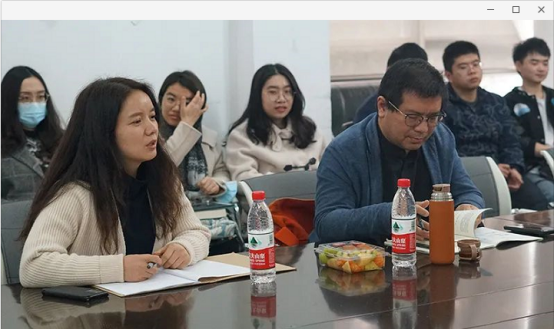5 March 2022
The Forum on "Doors and Walls of the Research on Regional Space History", hosted by the Faculty of Architecture and Urban Planning, was held in Meeting Room 203 of the Faculty of Architecture and Urban Planning CQU on March 5, 2022. Prof. Feng Jiang from the School of Architecture of South China University of Technology was invited to the Forum as the keynote speaker. Prof. Yang Yuzhen from the Faculty of Architecture and Urban Planning, CQU, Prof. Chen Wei from the Institute of Architectural History and Theory of the Faculty of Architecture and Urban Planning, Associate Professor Dai Qiusi, Associate Professor Leng Jie, Liao Yudi and Tang Cong, teachers of the Faculty, appeared at the Forum as honored guests upon invitation. Prof. Feng Di from the Institute of Architectural History and Theory of the Faculty of Architecture and Urban Planning chaired the Forum.

▲Chairman Prof. Feng Di
Forum review
At the beginning of the Forum, Feng Jiang shared his personal experience in research on the regional space history and how he was closely connected with it, and explained the connotation of "doors and walls" in the research on regional space history. Feng held that it was easy to learn the "rudiments (doors)" of regional space history, but it was difficult to break the "walls" (limitations) of the research scope. According to Feng, the "doors" of regional space history should not divide the history and region into tiny and broken pieces, which may bring us to a road that leads nowhere. Feng pointed out that the "field investigation" method should always be used in the regional research, that the researchers should be brave enough to break the disciplinary barriers and draw on the research methods of the history and anthropology disciplines.

▲Prof. Feng Jiang, the keynote speaker
After that, Feng Jiang introduced to the attendants a book named Function Evolution of Spaces, made up of 10 papers picked carefully by himself, and shared his feelings about and experience in the research on regional space history with the students present. Feng compared "breakpoint resume" of Rome to the problems currently facing Guangzhou, and tried to break the dilemma in learning "rudiments" of regional research. Taking the morphogenesis and "li" of the Prefecture of Guangzhou as an example, Feng encouraged the students to be brave enough to break the "walls" in the research scope. During his speech, Feng gave rigorous and detailed analysis using witty languages, and shared the stories behind the research objects including Huitong Village, Tangjiawan, ancestral halls during the period of people's commune and Sea-hill House.
Discussion and Q&A
In the discussion part, Yang Yuzhen expressed his recognition of the importance of spontaneous interdisciplinary research, and expounded on the definition of "prefecture", "li" and "city" in the Function Evolution of Spaces. According to Yang, what's interesting in history research was not consolidating knowledge in the textbooks, but the vivid and realistic expression in the historical circumstance. Dai Qiusi showed her agreement with the view expressed in the speech that "we should go beyond the building itself", and had a discussion with Keynote Speaker Feng Jiang over the "rehabilitation research" mentioned in the Sea-hill House case.

▲Prof. Yang Yuzhen, an honored guest invited to the discussion part
In the student Q&A part, Keynote Speaker Feng Jiang offered detailed and patient answers to questions raised by students as to "the future of rural construction and development", "how we should balance the typicality and particularity of research cases", "and how we should balance the conflict between the practicability and spirit of ancestral halls in the period of communization".

▲Student Q&A
Chen Wei expressed her hope that the students could really learn something from the 3-hour forum, and find out who they really are in doing academic research in the future. The Forum on "Doors and Walls in the Research on Regional Space History" was brought to a successful end amidst roars of applause of teachers and students.

▲Prof. Chen Wei, an honored guest invited to the discussion part
